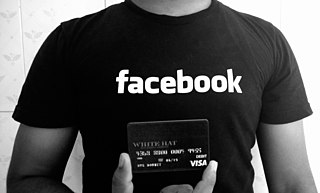Related Research Articles
An exploit is a method or piece of code that takes advantage of vulnerabilities in software, applications, networks, operating systems, or hardware, typically for malicious purposes. The term "exploit" derives from the English verb "to exploit," meaning "to use something to one’s own advantage." Exploits are designed to identify flaws, bypass security measures, gain unauthorized access to systems, take control of systems, install malware, or steal sensitive data. While an exploit by itself may not be a malware, it serves as a vehicle for delivering malicious software by breaching security controls.

A password, sometimes called a passcode, is secret data, typically a string of characters, usually used to confirm a user's identity. Traditionally, passwords were expected to be memorized, but the large number of password-protected services that a typical individual accesses can make memorization of unique passwords for each service impractical. Using the terminology of the NIST Digital Identity Guidelines, the secret is held by a party called the claimant while the party verifying the identity of the claimant is called the verifier. When the claimant successfully demonstrates knowledge of the password to the verifier through an established authentication protocol, the verifier is able to infer the claimant's identity.

Adobe Acrobat is a family of application software and web services developed by Adobe Inc. to view, create, manipulate, print and manage Portable Document Format (PDF) files.
In cryptography, a certificate authority or certification authority (CA) is an entity that stores, signs, and issues digital certificates. A digital certificate certifies the ownership of a public key by the named subject of the certificate. This allows others to rely upon signatures or on assertions made about the private key that corresponds to the certified public key. A CA acts as a trusted third party—trusted both by the subject (owner) of the certificate and by the party relying upon the certificate. The format of these certificates is specified by the X.509 or EMV standard.
Microsoft Exchange Server is a mail server and calendaring server developed by Microsoft. It runs exclusively on Windows Server operating systems.

Privilege escalation is the act of exploiting a bug, a design flaw, or a configuration oversight in an operating system or software application to gain elevated access to resources that are normally protected from an application or user. The result is that an application or user with more privileges than intended by the application developer or system administrator can perform unauthorized actions.
Single sign-on (SSO) is an authentication scheme that allows a user to log in with a single ID to any of several related, yet independent, software systems.
A federated identity in information technology is the means of linking a person's electronic identity and attributes, stored across multiple distinct identity management systems.
Crimeware is a class of malware designed specifically to automate cybercrime.
Watering hole is a computer attack strategy in which an attacker guesses or observes which websites an organization often uses and infects one or more of them with malware. Eventually, some member of the targeted group will become infected. Hacks looking for specific information may only attack users coming from a specific IP address. This also makes the hacks harder to detect and research. The name is derived from predators in the natural world, who wait for an opportunity to attack their prey near watering holes.
A Google Account is a user account that is required for access, authentication and authorization to certain online Google services. It is also often used as single sign-on for third party services.
Operation Aurora was a series of cyber attacks performed by advanced persistent threats such as the Elderwood Group based in Beijing, China, with associations with the People's Liberation Army. First disclosed publicly by Google on January 12, 2010, by a weblog post, the attacks began in mid-2009 and continued through December 2009.
Trusteer is a Boston-based computer security division of IBM, responsible for a suite of security software. Founded by Mickey Boodaei and Rakesh K. Loonkar, in Israel in 2006, Trusteer was acquired in September 2013 by IBM for $1 billion.

Goatse Security (GoatSec) was a loose-knit, nine-person grey hat hacker group that specialized in uncovering security flaws. It was a division of the anti-blogging Internet trolling organization known as the Gay Nigger Association of America (GNAA). The group derives its name from the Goatse.cx shock site, and it chose "Gaping Holes Exposed" as its slogan. The website has been abandoned without an update since May 2014.

A Microsoft account or MSA is a single sign-on personal user account for Microsoft customers to log in to consumer Microsoft services, devices running on one of Microsoft's current operating systems, and Microsoft application software.
Social login is a form of single sign-on using existing information from a social networking service such as Facebook, Twitter or Google, to login to a third party website instead of creating a new login account specifically for that website. It is designed to simplify logins for end users as well as provide more reliable demographic information to web developers.
Browser security is the application of Internet security to web browsers in order to protect networked data and computer systems from breaches of privacy or malware. Security exploits of browsers often use JavaScript, sometimes with cross-site scripting (XSS) with a secondary payload using Adobe Flash. Security exploits can also take advantage of vulnerabilities that are commonly exploited in all browsers.

The social media platform and social networking service Facebook has been affected multiple times over its history by intentionally harmful software. Known as malware, these pose particular challenges both to users of the platform as well as to the personnel of the tech-company itself. Fighting the entities that create these is a topic of ongoing malware analysis.

Rafay Baloch is a Pakistani ethical hacker and security researcher. He has been featured and known by both national and international media and publications like Forbes, BBC, The Wall Street Journal, The Express Tribune and TechCrunch. He has been listed among the "Top 5 Ethical Hackers of 2014" by CheckMarx. Subsequently he was listed as one of "The 15 Most Successful Ethical Hackers WorldWide" and among "Top 25 Threat Seekers" by SCmagazine. Baloch has also been added in TechJuice 25 under 25 list for the year 2016 and got 13th rank in the list of high achievers. Reflectiz, a cyber security company, released the list of "Top-21 Cybersecurity Experts You Must Follow on Twitter in 2021" recognizing Rafay Baloch as the top influencer. On 23 March 2022, ISPR recognized Rafay Baloch's contribution in the field of Cyber Security with Pride for Pakistan award. In 2021, Islamabad High court designated Rafay Baloch as an amicus curia for a case concerning social media regulations.
References
- 1 2 Kovacs, Eduard (May 24, 2022). "Hackers Can 'Pre-Hijack' Online Accounts Before They Are Created by Users". Security Week. Retrieved 2022-05-31.
- ↑ Brinkmann, Martin (2022-05-24). "Pre-hijacking Attacks of user accounts are on the rise". gHacks Technology News. Retrieved 2022-05-31.
- ↑ Andrew Paverd (May 23, 2022). "New Research Paper: Pre-hijacking Attacks on Web User Accounts". Microsoft Security Response Center. Retrieved 2022-05-31.
- ↑ Dickson, Ben (2022-05-30). "Dozens of high-traffic websites vulnerable to 'account pre-hijacking', study finds". The Daily Swig. Retrieved 2022-05-31.
- 1 2 Sudhodanan, Avinash; Paverd, Andrew (2022-05-20). "Pre-hijacked accounts: An Empirical Study of Security Failures in User Account Creation on the Web". arXiv: 2205.10174 [cs.CR].